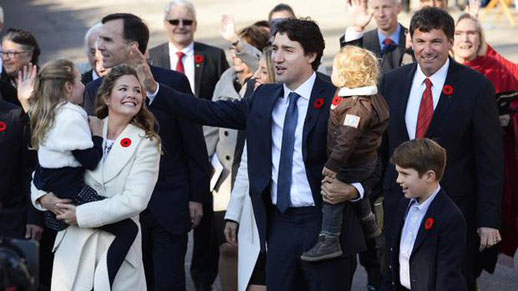
This past Wednesday, there was something vaguely romantic, a nostalgia-inducing cinematic, neo-realist quality to the proceedings that occurred when Canadians were able to see Justin Trudeau, his wife Sophie Grégoire, their two older children, Ella-Grace and Xavier, by their side, and the thirty new, incoming cabinet ministers strolling in behind the Trudeau family, all of them ambling together down the driveway toward Rideau Hall, Canada’s government house, blessed by the sun and the 3500-strong throng of supporters, on an unseasonably warm mid-autumn Ottawa morning. And then, when young Trudeau son Hadrien, just a year old, ran towards his father, jumping into his arms, seeing his father and mother light up with smiles … well, you couldn’t help but tear up at this most human scene.
Contrast the above warmly inviting familial scene with the 2006 first capturing of Stephen Harper with his two children heading off to school on the day after Mr. Harper became our 22nd Prime Minister — stiff and unyielding, formally shaking his son Ben’s hand as if he’d never met him before, with no hug for his then six-year-old tow-headed daughter, Rachel.
Make no mistake, dear and constant reader, Camelot has come to Canada.
If the scene described in the first paragraph above was captured in a Hollywood movie, you’d likely be caused to reflect about the unreality of it all — but, Canadians, this is in point of fact our new human-scale Canada, the new activist Canada, as Dominic LeBlanc, Liberal Party house leader and boyhood chum of the Prime Minister, constructed the early days of “Trudeau the younger’s” sunny ways incoming federalist administration.
The National Post’s John Ivison lauded “the positive symbolism” of the incoming Trudeau administration, “the atmosphere providential and full of possibility, and a powerful antidote to the severe, austere Harper years.”
As was to be expected, the first question in the scrum held on Parliament Hill following the swearing-in ceremony and the first meeting of the Trudeau cabinet, referenced the election commitments of the Liberal party on proportional representation, and a time frame for the regulation and legalization of marijuana — both commitments remain at the top of the government’s agenda, Mr. LeBlanc said, reinforcing to the assembled reporters that the Liberal government would move both pieces of legislation within the first 18 months of the new Trudeau administration.
The very next day, two of Canada’s more powerful ministers of the Crown — Minister of Innovation, Science and Economic Development Navdeep Bains, accompanied by Minister of Families, Children and Social Development, Jean-Yves Duclos — set about to announce to Canadians that the new government would reinstate Statistic Canada’s long-form census.
“We need good, reliable data,” stated Mr. Bains, in a media scrum. “We know the history of the last government, who were very much focused on ideology,” he said. “In contrast, the Liberal government is very much focused on sound, evidence-based policies, which will ensure that policy development in Canada will be driven by good evidence and quality data.”
Activist, indeed, and we’re all the better for it, with much more to come.
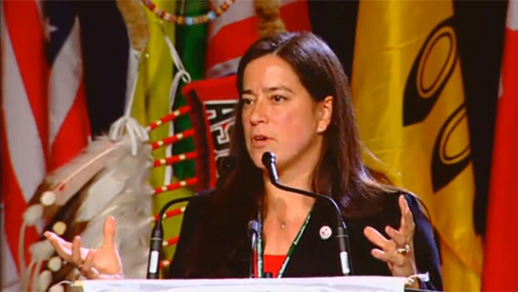
Much of the media focus in the first couple of days of the new Trudeau administration focused on two newly-appointed cabinet ministers hailing from British Columbia, Justice Minister and Attorney-General of Canada, and Member of Parliament for the newly-created riding of Vancouver-Granville, Jody Wilson-Raybould, and Harjit Sajjan, Canada’s new very able and well-experienced Defence Minister, a very real Canadian braveheart.
A CBC archive video, referencing Ms. Raybould-Wilson when she was a child, and making the rounds on social media on Thursday, focused on a 32-year-old exchange between First Nations leader Bill Wilson, the father of the newly sworn-in federal Justice Minister, and then prime minister Pierre Elliott Trudeau, the father of Canada’s newly sworn-in PM, Justin Trudeau.
Meanwhile, Mr. Sajjan, in broad and supportive media coverage in the first 48 hours of the new governmental administration has emerged in the eyes of many as a Canadian hero, reporters and members of the opposition alike waxing poetic about the new minister as a “true badass” whose work in the military in Afghanistan yielded crucial intelligence on the Taliban defences.
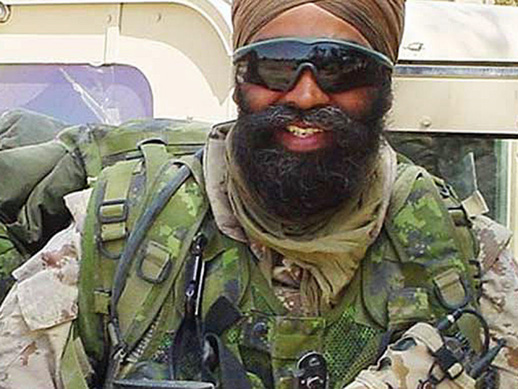
A defeated opposition weighs in on Canada’s new government
Contrast the first impressions of the new government, the conduct of a newly accessible Prime Minister, and cabinet ministers prepared to answer all questions put to them by the media, with yesterday’s coverage of the increasingly dour and hard-hearted leader of Canada’s third-party, the New Democratic Party’s Tom Mulcair — who could never pull off the kind of hope and change message the new government embodies. All the bearded one had to say was that it was the NDP who are the progressive party of change, not the Liberals, and it was he and his shadow cabinet who held the Harper government to account, while Mr. Trudeau went “gallivanting” across Canada, an “absent figure” on Parliament Hill. True — but who cares? Yawwnnn … yesterday’s news. Mr. Mulcair: you lost the election — a little humility might be in order, if not a statement of outright mea culpa.
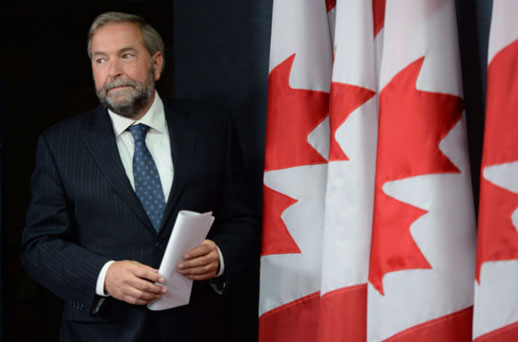
You could hear, as well, in Thursday’s NDP rhetoric what the tone of the first day of a New Democratic Party administration might have been, not “sunny ways”, but rather rhetoric focused on statements not dissimilar to, “Ewww, the books are way worse than we expected. We’re going to have to hold off on that change-y thing we were talking about. Not to mention, it’s a cruel world out there — maybe we oughta rethink our position on repealing Bill C51.” With the NDP it was always thus, dark statements devoid of hope, and a seeming inability to capture the public’s imagination.
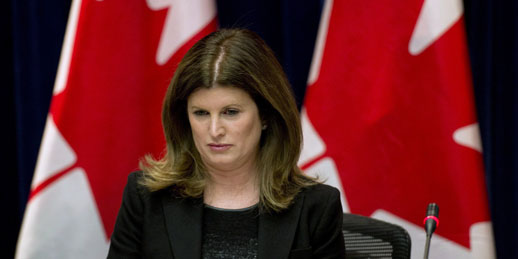
Meanwhile, the Conservatives have elected Ayn Rand-loving Rona Ambrose as their interim leader, and leader of Her Majesty’s loyal opposition, hardly a departure from what came before (i.e. the secretive Stephen Harper), who took only two questions when the announcement of her new position was made public, the “scrum” cut short when Ms. Ambrose’s faltering, and hardly up to par, French became all too evident, as she couldn’t answer questions put to her in Canada’s “other” official language — one can just imagine how many questions in French will be placed to Ms. Ambrose in the House in the days to come; it ain’t gonna be pretty, folks.
The takedown has already begun
From Andrew Coyne’s ludicrous, regressive column in the National Post, taking Mr. Trudeau to task for appointing a cabinet that had as one of its goals gender parity, to Christie Blatchford’s takedown of the positive coverage of Trudeau’s “ascension to the throne” in the same, right-wing rag, reporters across all media have proved more than cynical about the opening days of the Trudeau administration, from the “pageantry” of the opening day, to the news that five of the female ministers in the Trudeau cabinet are not, in fact, full-fledged ministers but “junior” ministers of state who must report to senior ministers to sign off on legislation.
On the latter issue above, a spokesperson for the Trudeau government stated emphatically that although it is, at present, contrary to the Act that governs such things, the appointed ministers of state will become, and are to be considered by Canadians to be full-fledged ministers of the crown in the Trudeau cabinet, rather than junior ministers, that each new minister will be compensated as such (note: ministers of state receive $60,000 per year on top of the $167,000 MP salary, while full ministers receive $80,000 — looks like legislation to enforce the claims of the spokesperson will be on the legislative agenda when Parliament resumes on December 3rd).
In the early days of the new Justin Trudeau-led Liberal government, expectations have been set impossibly high — no government, not even that of the affable and approachable Mr. Trudeau, could possibly live up to the expectations for the …
“… most open, transparent and consultative government in Canadian history, a government that will act upon the wishes of all Canadians for a fairer and more just Canada, where child poverty will once and for all be eradicated, where equality of opportunity for all Canadians will carry the day, where Canadians will feel safe and secure within our borders in a too often uncertain world, a Canada where there will be a focus on the environment and the taking of very real measures to reduce the effects of climate change in Canada and across our globe, where the war on drugs will finally come to an end, and where the voices of Canadians will be heard and felt at the ballot box as Canada moves forward to an electoral system based on proportional representation, where every Canadian’s vote will count. These, and the more than 300 commitments the Liberal government has made to Canadians will come to pass — patience will be required, but make no mistake, real change is on its way in Canada.”
Camelot — a fantastical realm of romance and possibility, in our Canada.
Let us hope, for all our sakes, that the most positive aspects of Camelot come to pass, and not the failed idealism of the Arthurian legend, that change becomes papably real in Canada in the months and years to come, to be reflected in the social and economic experience of all Canadians.